.avif)
10 Best FSMA Compliance Software in 2026
Finding the right FSMA compliance software is critical for meeting FDA regulations, including FSMA 204 traceability rules. These platforms streamline supplier compliance, recall tracking, and food safety documentation so you can stay audit-ready and protect your brand. Here are the top solutions in 2025:
Best FSMA Compliance Software Shortlist
- Allera – Best for AI-powered document control and supplier compliance.
- Foodflou – Best for unified QA workflows and full supplier visibility
- FoodLogiQ by Trustwell – Best for recall tracking and supply chain visibility
- SafetyChain – Best for plant-floor data collection and FSMA reporting
- OpsSmart – Best for end-to-end food traceability with blockchain support
- TraceGains – Best for supplier onboarding and compliance automation
- FoodReady AI – Best for AI-driven HACCP and compliance documentation
- Normex – Best for SQF and FSMA compliance consulting software
- Infor – Best for ERP-driven compliance integration
- Repositrak – Best for retail compliance and traceability networks
Why Trust Our Software Reviews?
Allera is a provider of FSMA compliance software and food safety software, so it’s fair to question our perspective when evaluating competitors. But our mission is simple: Make Food Safe For Everyone. Transparency matters because producers and customers depend on tools that directly impact safety. That’s why we commit to making this review comprehensive and data-driven.
We rank solutions using a consistent rubric: Compliance, Traceability, Ease of Use, Scalability, and Support. Ratings are based on what’s publicly documented on each vendor’s official website. Pros and cons reflect real-world buyer priorities, not marketing copy. There is no pay-to-play; any conflicts are disclosed.
If you are a vendor and see outdated information, please reach out so we can update our listings quickly.
What to Look for in FSMA Compliance Software
When evaluating FSMA compliance software, we make sure they are all compliant with the 5 predicted changes coming to FSMA 204.
- Traceability features – Can it track lot codes, ingredients, and finished goods across your supply chain?
- Supplier compliance tools – Does it simplify onboarding, certification tracking, and automated reminders?
- Recall management – How quickly can you execute a recall scenario and generate reports?
- Integration – Does it connect with your ERP, quality, and production systems?
- Audit readiness – Does it keep your documents version-controlled and accessible for FDA inspections?
10 Best FSMA Compliance Software in 2026 Breakdown
Not all compliance software is created equal. Some excel at supplier document collection, others specialize in recall tracking software with FSMA compliance. The best choice depends on your facility size, certification needs, and integration requirements. Let’s break down the leading platforms.

Allera
Allera is a top FSMA compliance software used by 500+ food & beverage manufacturers to maintain compliance. The platform allows you to centralize document control, automate supplier management, and digitize FSQA records for audit readiness under FDA/SQF/BRCGS & more frameworks.
Allera Features
Allera centralizes FSQA evidence, connects suppliers, and replaces paper logs with searchable, timestamped records and audit trails so teams can prove compliance quickly.
- Document Control & Records - Controlled FSQA documents with approvals, e-signatures, version history, and audit trails.
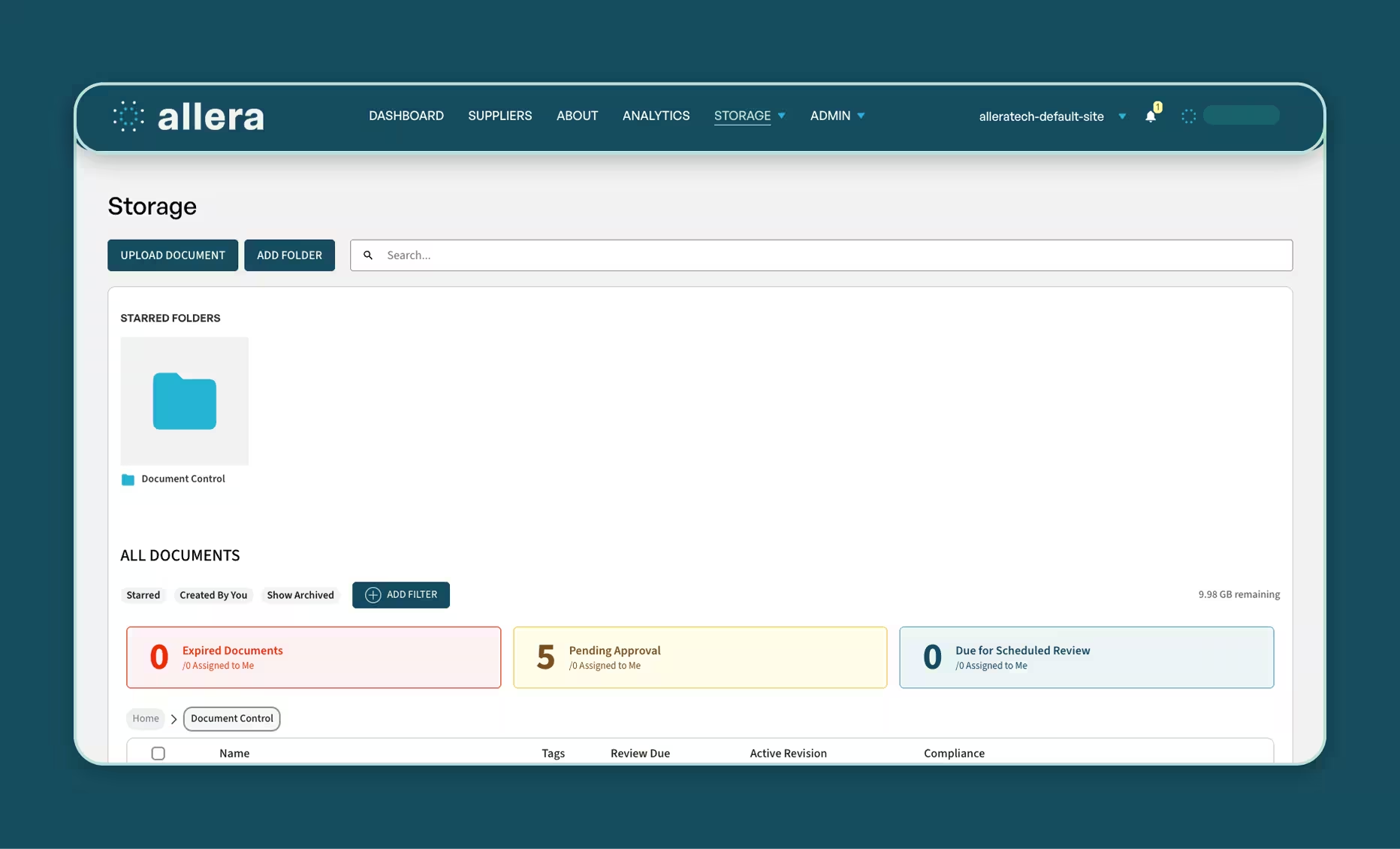
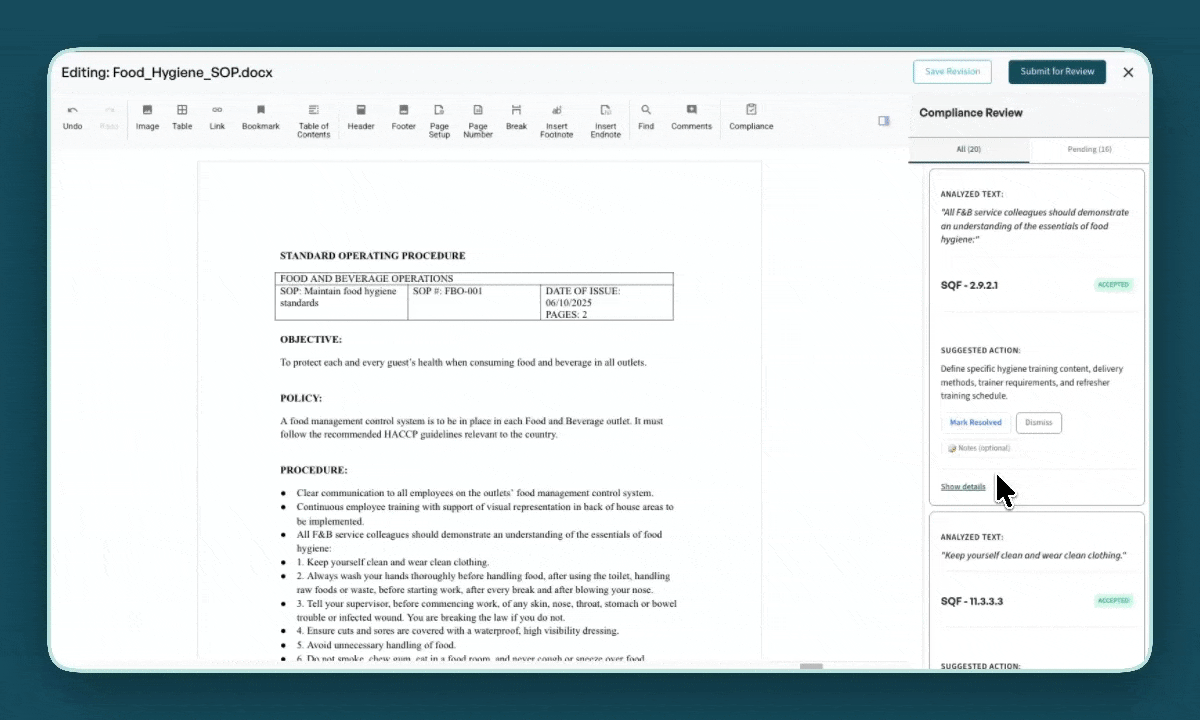
- Supplier Verification - Centralized supplier documents, automated requests, and expiration tracking (no spreadsheets, no email chasing).
Manufacturer/processor view:
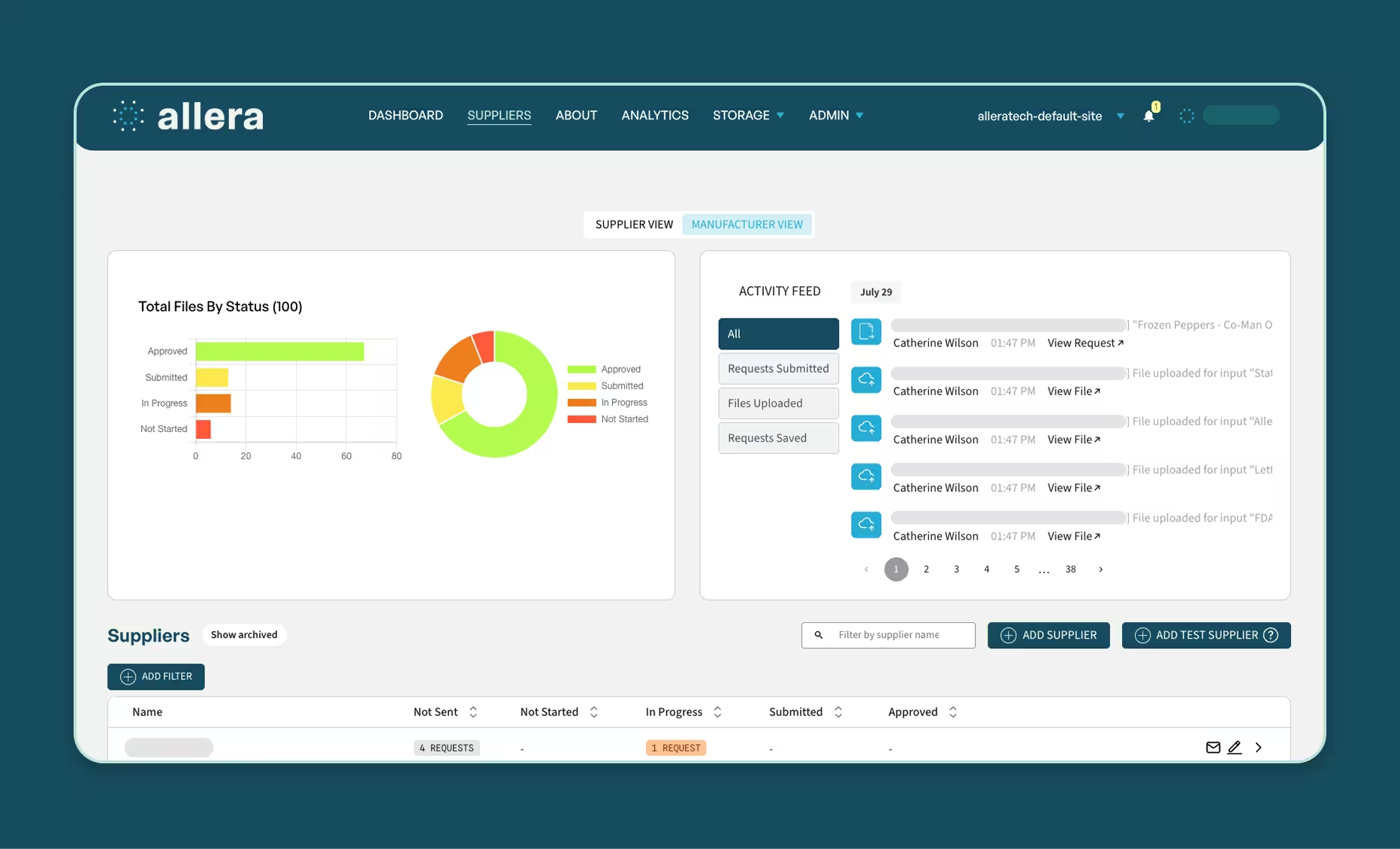
Supplier view:
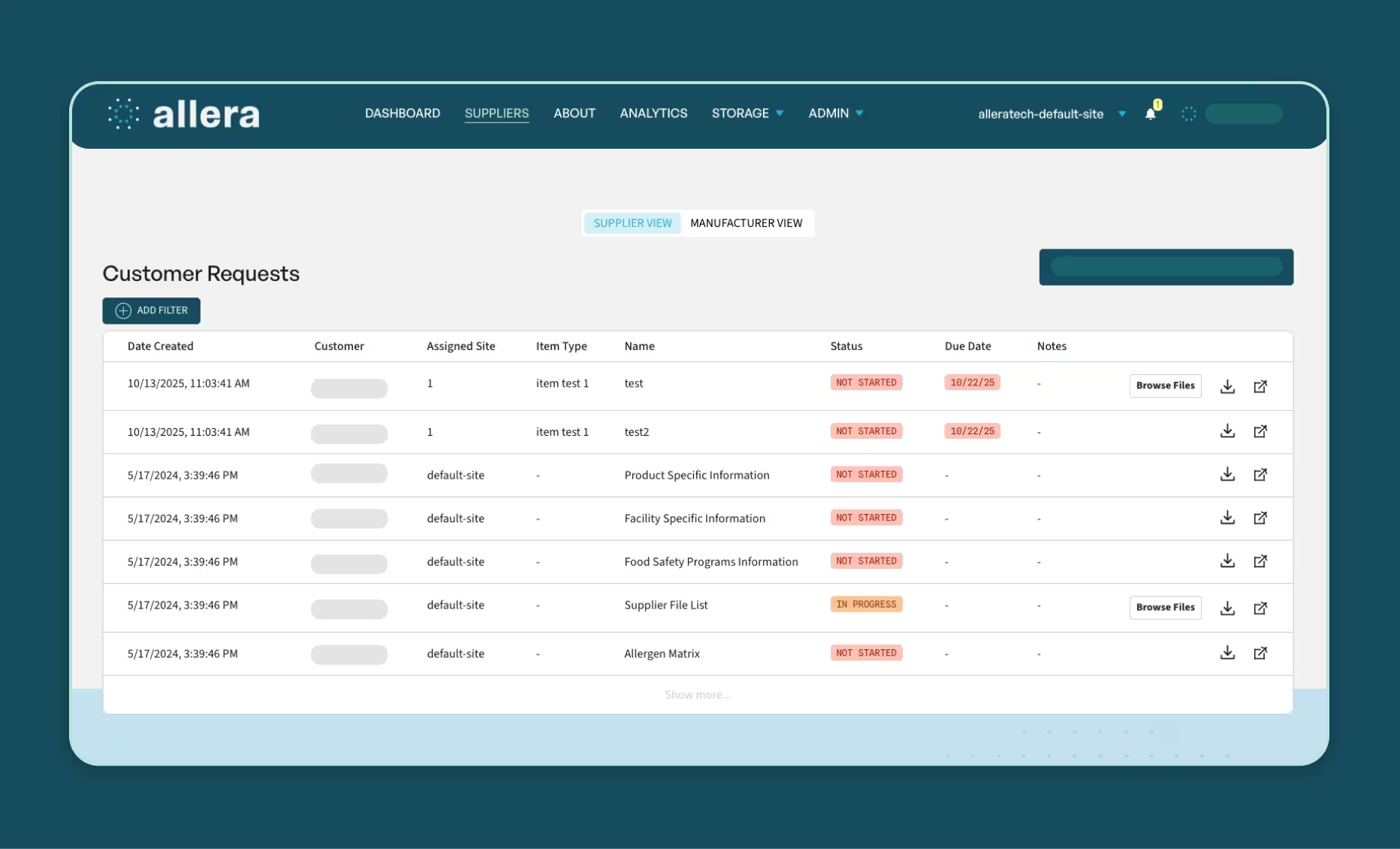
- Digital FSQA Logs (Preventive Controls) - Replace paper logs for CCPs, sanitation, allergens, and checks with timestamped, attributed records.
.avif)
- Corrective Actions / CAPA - Log deviations, assign actions, attach evidence, and track closure.
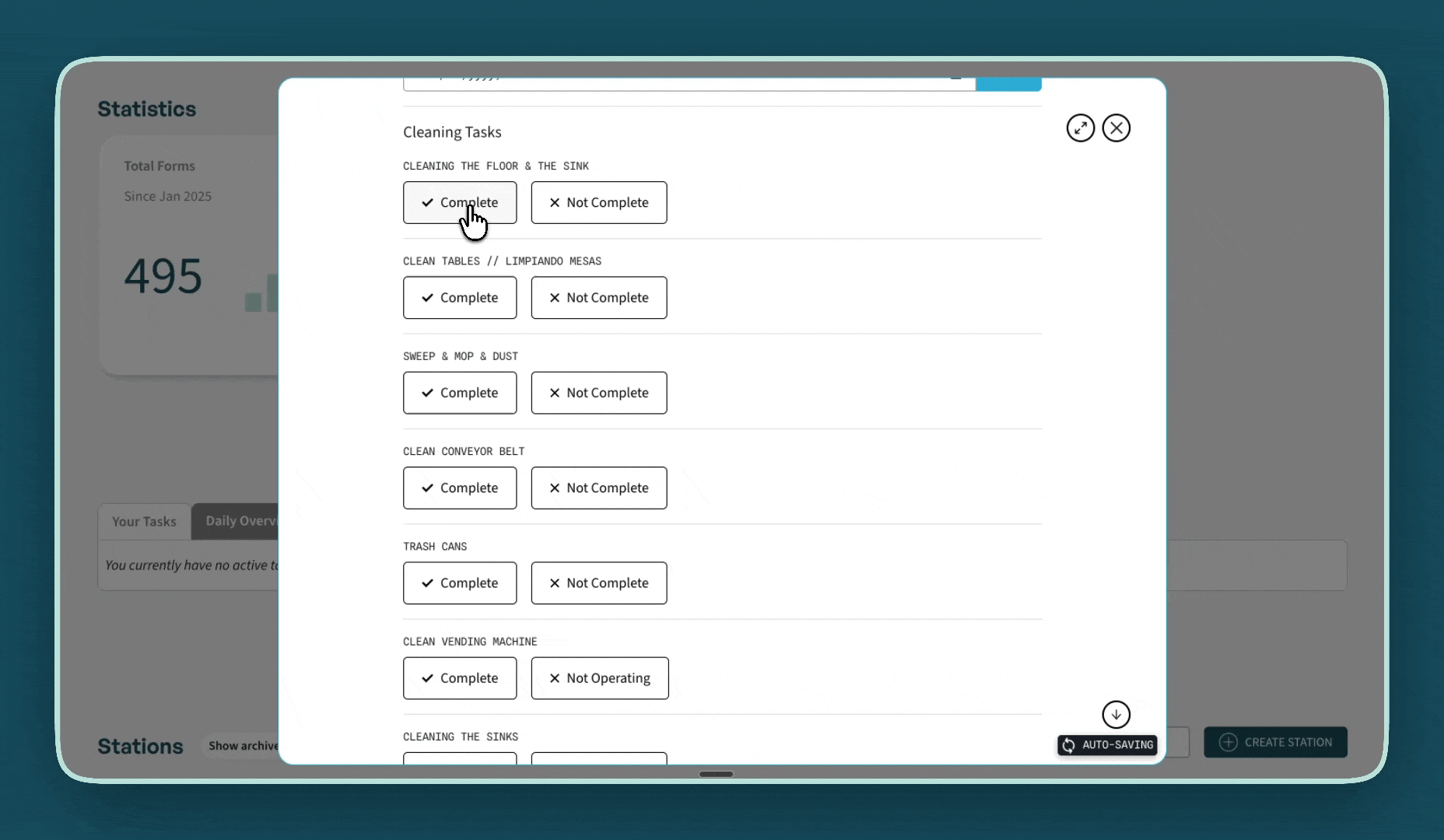
- Audit-Ready Evidence- Searchable, time-stamped records with full traceability for audits and inspections.
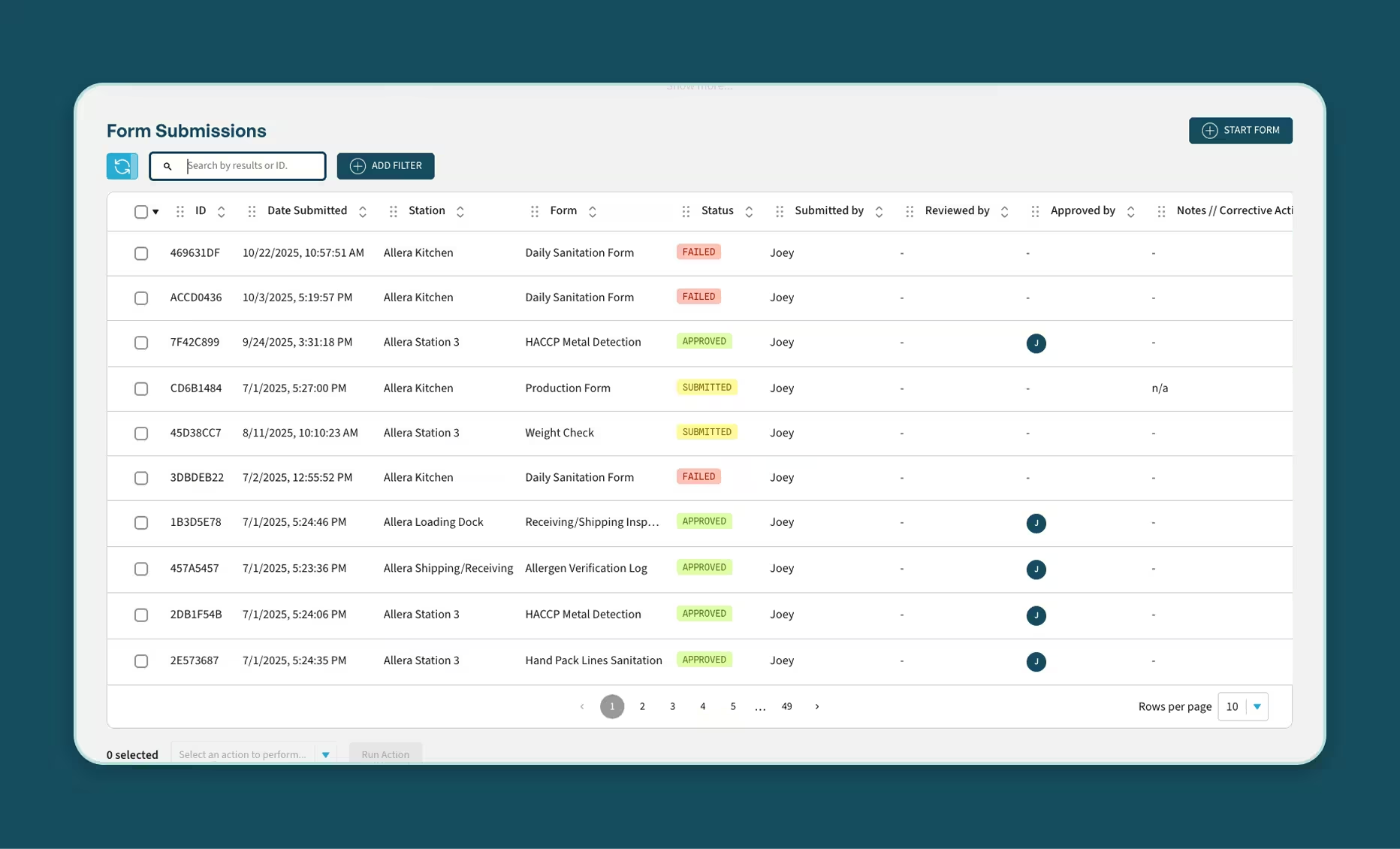
What makes Allera worthy of first place?
The AI Features:
- Digitize all FSQA paperwork instantly with an AI form builder
- AI Compliance: ties your SOPs to SQF codes and provides editing suggustions
Standards & Regulatory Compliance Support
Allera supports regulatory and audit frameworks such as FSMA and SQF (a GFSI‑benchmarked standard), offering centralized documentation, traceability, and real‑time compliance tracking to meet those standards efficiently.
Allera's Pros & Cons
Now that you understand what Allera does and who it's for, let's get a balanced view.

Pros

Cons
- Not a global ERP suite: Very large, multi-entity rollouts with deep MES/ERP standardization may require extra integration work.
- Industry focus: Built for food manufacturers and producers—not aligned with restaurant/retail POS or primary agriculture workflows.
Practical Review of Allera
Allera delivers a powerful, user-friendly platform for FSMA and SQF-oriented food manufacturers, excelling in document control, supplier automation, and audit readiness—especially where rapid deployment and modern digital transformation are priorities.

Foodflou
Foodflou gives QA teams full supplier visibility, document control, and one place for NCRs, audits, forms, CAPAs, and more. It ends version issues, automates tasks, and keeps teams aligned to reduce audit risks and ensure GFSI and BRCGS compliance.
Foodflou Features
- Document management with automatic version control, change logs and approval workflows
- Central supplier management with full supplier overview including linked products, quality events, documents, audit logs and trends
- Integrated CAPA, complaints and non-conformance handling
- Automated tasks with recurring schedules
- AI co pilot for real time monitoring, updates and alerts
- Custom forms, inspections and advanced reporting with a flexible report builder
Pros & Cons

Pros
- User friendly platform with quick onboarding and easy, no-code customization
- Strong document control with clear versioning, approvals and audit-ready records
- Good regulatory coverage with full traceability from raw materials to finished goods
- Full supplier management with clear performance and documentation visibility
- AI copilot that keeps compliance on track with real time updates and alerts

Cons
- Limited multilingual support across the platform
- Not equipped with automated HACCP builder
- Lacks a built in SOP templates library
- No horizon scanning features for regulatory changes

FoodLogiQ
FoodLogiQ (by Trustwell) is a cloud-based supply chain and traceability platform focused on enabling FSMA‑compliant operations through audit-ready documentation, supplier onboarding, lot‑level traceability, recall management, and quality incident tracking.
FoodLogiQ Features
FoodLogiQ Compliance & Certifications Support
FoodLogiQ Compliance module is designed to meet a wide spectrum of food safety and traceability standards, streamlining audit readiness.
Notes: FSSC 22000, GMP, and Part 11 compliance are not labelled; their status is “Not stated” based on available info.
FoodLogiQ Pros & Cons
Now that we understand more about FoodLogiQ, let's inspect the software's good and bad.

Pros

Cons
Overall FoodLogiQ Rating
FoodLogiQ shines in most areas, but can be hard to learn for food safety/QA teams on the plant.

SafetyChain
SafetyChain is a digital plant management platform designed for food and beverage manufacturers, offering real‑time visibility and control across quality, compliance, operations, and supplier management. It streamlines FSMA compliance through digitized workflows, audit-ready documentation, and integration with existing systems.
SafetyChain Features
SafetyChain delivers a configurable, mobile-friendly platform enabling digitized workflows, real‑time monitoring, and audit-readiness across the plant floor, compliance, and supplier network.
- Digital Forms & Workflows: No-code creation of inspections, checklists, HACCP monitoring, GMPs, CAPA—all mobile-accessible.
- Audit Readiness & Compliance Documentation: Centralized digital binder for FSMA, GFSI, SQF, BRC, ISO, and customer audits, with secure auditor access.
- In-Process Quality Monitoring: Real-time checks including allergen testing, weight & fill, finished goods inspection, pre‑shipment reviews.
- Production Performance Analytics: Live dashboards for downtime, OEE, throughput; includes integrations (e.g., Ignition), SPC for variability control.
- Process/Data Control & Reporting: SPC tracking, mobile charts, custom report builder, Power BI connectors, automated tasks.
- Supplier Compliance & Traceability: Supplier portal, requirement tracking, automated communications, expiration alerts, and FSMA 204 support for KDE/CTE workflows.
SafetyChain Compliance & Standards Support
SafetyChain Pros & Cons
A balanced view of SafetyChain’s strengths and limitations in the FSMA compliance space. Based on publicly available data such as user reviews on G2 and other sources.

Pros

Cons
SafetyChain Overall Rating
See if SafetyChain is strong in the areas most important to your food business. Rating is based on public data we've gathered about SafetyChain and the reviews available online.

OpsSmart
OpsSmart is a cloud-based food traceability and compliance platform that spans the supply chain, integrating with legacy systems to ensure FSMA, HACCP, and GS1 compliance. It enables rapid recalls, forward/backward trace, multi-lingual access, and blockchain-backed audit trails with e-signatures.
OpsSmart Feature List
OpsSmart combines configurable traceability with compliance tooling, supplier/ingredient controls, and recall execution to meet FSMA and other regulatory demands.
- Configurable forward/backward traceability: Start a trace at any process, move upstream or downstream, and isolate impacted lots quickly.
- Recall management in minutes: Trace affected products, view CCP results and documents in one place to accelerate actions.
- Audit readiness toolkit: Audit log/locks, electronic signatures, audit trail, approvals, scheduling, and a central document repository.
- Compliance facilitation: Supports FSMA, HACCP, GFSI programs, EU/Japan food law; GS1 barcode standards.
- Supplier management & FSVP: Approval workflows, pre-arrival safety/quality capture, in-facility monitoring, complaint tracking, historical performance.
- Ingredient traceability & mass balance: See where raw materials go, which SKUs contain them, and internal/external availability.
- Interoperability standards: Alignment with GS1 EPCIS and GDST (KDEs/CTEs) for cross-party data exchange.
- Data capture options: Handheld devices, QR/RFID/Barcodes; blockchain ledger for immutable records.
- Multi-lingual access: 12 languages; each supply-chain participant can view data in their own language.
OpsSmart compliance & standards Support
OpsSmart is designed to facilitate regulatory and standard-program compliance (FSMA, HACCP, GFSI) with built-in audit tools and GS1 conformance; it also aligns with GDST for seafood traceability.
OpsSmart Pros & Cons
Highlights reflect vendor publications and credible third-party listings; public, crowdsourced reviews are limited.

Pros

Cons
OpsSmart – Overall Rating
OpsSmart delivers strong compliance enablement, enterprise-level traceability, and interoperability with industry standards. While powerful, it comes with higher costs and complexity that may challenge smaller businesses.
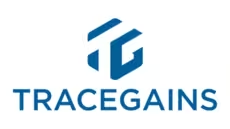
TraceGains
TraceGains is a cloud-based, networked platform designed for food and beverage companies to manage supplier documentation, ingredient specifications, quality control, and compliance workflows—including FSMA—via centralized digitization, AI-enabled document processing, and supplier collaboration
TraceGains Features
TraceGains offers a broad suite of tools that deliver compliant, efficient supplier and quality management:
- Supplier Management: Digitizes supplier and ingredient data with templates, auto-document requests, OCR data capture, audit trails, risk scoring, and dashboards
- Supplier Compliance: Automates COA validation, flags non-conformances, tracks performance by supplier, lot, and geography using AI-powered Intelligent Document Processing (IDP)
- Quality Management: Central repository for safety, SOPs, quality data, corrective actions, and audit readiness
- Audit Management: Automates audit workflows with pre-loaded templates, checklists, tracking, remote collaboration, CAPA linkage, and corrective/preventive action integration
- Specification Management & Product Development: Enables creation and management of raw material/finished goods specs, version control, supplier collaboration, and integration with formulation and R&D workflows
- Regulatory & Horizon Scanning: Offers tools to stay ahead of changing regulations and capture relevant global safety/incident updates (though details were limited)
TraceGains Compliance & Standards Support
TraceGains supports compliance with numerous key food safety regulations and standards:
Pros & Cons of TraceGains
TraceGains has both good and bad. Read the pros and cons below to get a more informed look.

Pros

Cons
Overall Rating (TraceGains)
TraceGains is a strong FSMA compliance solution, especially for medium to large manufacturers with complex supplier networks. Its automation, audit readiness, and supplier connectivity are major advantages, but challenges like limited customization, reliance on suppliers, and an aging interface prevent it from being flawless.

FoodReady AI
FoodReady AI is an AI-powered, all-in-one food safety compliance platform that combines software and expert consulting to streamline FSMA (especially FSMA 204) readiness through automated traceability, document management, HACCP plan building, and recall preparedness.
FoodReady AI Features
Certifications & Regulatory Support
FoodReady AI supports compliance across multiple frameworks, pairing its software capabilities with consulting to help clients meet both regulatory requirements and GFSI-recognized standards.
FoodReady AI Software Pros & Cons: Realistic Perspective
Let's take a deeper look at FoodReady's FSMA compliance capabilities, both good and less than good.

Pros

Cons
Overall Grading for FoodReady AI
Does FoodReady excel at what matters to your food business the most? This is our unbiased rating based on publicly available reviews and features only.
.avif)
NORMEX
NORMEX is a cloud-based food safety and traceability platform aimed at automating HACCP/FSMA workflows, supplier compliance, and audit readiness for food businesses. Modules include document control, traceability, supplier management, inspections, CAPA, and reporting.
Key Features in NORMEX
NORMEX centralizes food safety programs and daily records to keep sites audit-ready and traceable end-to-end.
NORMEX Compliance & Standards Support
NORMEX is positioned to support compliance programs and audits by organizing records, traceability, and verification activities; the vendor references multiple schemes and FSMA topics across its materials.
NORMEX Pros & Cons
Short take: fast go-live for SMEs, solid audit/record control and traceability; watch for setup fees and enterprise-scale needs.

Pros

Cons
Overall rating for NORMEX
NORMEX supports FSMA/HACCP/GFSI programs with fast time-to-value for SMEs; enterprise needs (deep integrations/complex rollouts) may require added services.

Infor
Infor CloudSuite Food & Beverage is a purpose-built cloud (or on‑prem/hybrid) ERP solution tailored for the food & beverage industry. It delivers comprehensive tools—such as document management, quality control, traceability, and recall readiness—that support proactive compliance with FSMA requirements.
Features of Infor CloudSuite Food & Beverage
Infor CloudSuite Food & Beverage includes a rich suite of features designed for robust FSMA compliance and operational efficiency:
- Document Management — Captures and stores FSMA‑required documentation across hazard analysis, preventive controls, recall plans, sanitation, supplier verification, and more.
- Traceability & Recall Management — Graphical lot and sub‑lot tracking, origin data, and rapid recall tools for accurate response.
- Quality Control & Lab Inspection — Integrated quality management with LIMS/MES connectivity ensures proactive safety and compliance monitoring.
- Asset Management — Manages equipment maintenance to reduce contamination risk and support preventive controls.
- Labeling & Specification Management — Centralizes labeling and formulation data, aiding compliance with labeling laws and recipe traceability.
- Training & Collaboration — Includes Infor Ming.le social collaboration for communication and documentation across internal teams and suppliers.
- Supply Chain Visibility & AI‑driven Planning — Machine‑learning forecasting, S&OP, and supply‑chain planning support agility and compliance with dynamic regulatory demands
Infor CloudSuite Food & Beverage: Compliance & Standards Support
Pros & Cons of Infor CloudSuite Food & Beverage

Pros

Cons
Overall Rating of Infor CloudSuite Food & Beverage
This solution offers strong compliance infrastructure but demands careful implementation and investment.

ReposiTrak
ReposiTrak is a cloud platform for food traceability, supplier compliance documentation, and quality management. Its ReposiTrak Traceability Network (RTN) focuses on FSMA 204 data exchange, while Compliance Management and Active QMS digitize audits, records, and plant checks.
ReposiTrak features that matter for FSMS
ReposiTrak combines networked traceability with compliance document control and mobile QMS to centralize audit-ready records and FSMA 204 data flows.
How ReposiTrak supports compliance
ReposiTrak focuses on enabling organizations to meet regulatory and scheme requirements by digitizing records and FSMA 204 data exchange rather than being a certification itself.
ReposiTrak Pros & Cons
Highlights drawn from vendor documentation, app listings, industry coverage, and reviews on public sites like G2.

Pros

Cons
ReposiTrak Overall Grade
ReposiTrak offers strong FSMA 204 traceability with complementary compliance/QMS tooling; best fit for supplier-retailer ecosystems prioritizing regulatory data exchange and audit-ready records.
Why FSMA Compliance Software Matters for Food Manufacturers
The FDA’s Food Safety Modernization Act (FSMA) requires strict recordkeeping and traceability, especially under the FSMA 204 rule. Manual spreadsheets and paper binders no longer cut it.
Using dedicated software:
- Reduces compliance risk by automating document management
- Ensures timely supplier verification and monitoring
- Speeds up recall execution, reducing liability and brand damage
- Keeps you aligned with SQF, BRCGS, and other global food safety standards
For food manufacturers, the right compliance platform isn’t just a tool—it’s a safeguard against recalls, fines, and lost consumer trust.
How We Evaluated & Ranked The Best FSMA Compliance Software
Our rankings are based on:
- Compliance Coverage – Does the software meet FSMA 204 and global GFSI scheme requirements?
- Traceability Capabilities – Can it capture forward and backward lot tracking?
- Ease of Use – Is the interface intuitive for QA teams and suppliers?
- Scalability – Can it support growing facilities and multi-site operations?
- Support & Training – Does the vendor provide reliable onboarding and customer service?
We compared what’s publicly available from each vendor, including feature sets, customer case studies, and industry recognition.
The goal: help you select the best FSMA compliance software for your operations, whether you need simple supplier compliance or a fully integrated digital suite.
How Allera Can Help With FSMA Compliance
FSMA compliance in 2025 and beyond has fundamentally shifted. It's now more important than ever to have end-to-end visibility, reliable documentation, and the ability to act fast when regulators or auditors demand proof. Allera brings these capabilities together in a single platform, designed specifically for the challenges food manufacturers face under FSMA 204.
1. Supplier Compliance Made Easy
Allera streamlines supplier management with dynamic onboarding, automated reminders, and centralized documentation. Suppliers can upload certifications and records directly into the system—or even respond to an email—and everything is automatically organized. This eliminates the back-and-forth emails that slow down compliance and ensures you always know who’s up to date and who isn’t.
2. AI-Assisted Document Control
Version control, access permissions, and approval workflows make document management secure and transparent. What sets Allera apart is its AI-assisted compliance reviews, which automatically flag potential misalignments with standards like FSMA, SQF, or BRCGS. This gives your QA team a second set of eyes on every SOP or record, reducing the risk of noncompliance.
3. Recall Readiness and Traceability
Under FSMA 204, traceability is non-negotiable. Allera’s platform supports forward and backward trace, so you can track ingredients from suppliers through finished goods. In the event of a recall, you can generate a full food traceability report in minutes—protecting both consumers and your brand.
4. Integrated Training Management
Compliance doesn’t stop with documents. Allera links SOP updates directly to employee training, sending notifications and tracking acknowledgments. This ensures your workforce is always aligned with the latest compliance requirements, helping you prove to auditors that training is documented and effective.
5. Scalable and Audit-Ready
Whether you’re running a single facility or managing multiple sites, Allera scales with your operation. With real-time dashboards, approval workflows, and role-based access control, you can demonstrate compliance on demand, keeping your team and regulators confident in your processes.
In short: Allera doesn’t just digitize FSMA compliance—it transforms it into a proactive system. By uniting supplier management, digital forms, analytics, AI-powered document control, recall readiness, and training into one platform, Allera gives food manufacturers the confidence to stay audit-ready, minimize risks, and keep food safe from farm to fork.
Thank You for Reading
Thanks for taking the time to explore our roundup of the best FSMA compliance software in 2026. We hope this guide helped you understand your options and what to look for when choosing a solution that keeps your business compliant, efficient, and audit-ready.

.svg)